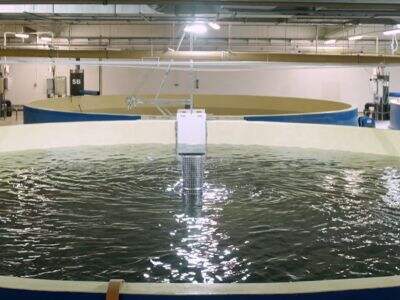জলচর প্রাণী চাষ বলতে মানুষ খাদ্যের জন্য মাছ চাষ করা হয় এমন ঘটনাকে বোঝায়। এটি সমুদ্রতটি পরিবর্তনশীল করে। মাছ চাষের দুটি প্রধান রূপ রয়েছে: ভূমি-ভিত্তিক এবং মহাসাগর-ভিত্তিক। এখন উভয়েরই নিজস্ব সুবিধা এবং অসুবিধা আছে। আমরা ভূমি-ভিত্তিক এবং মহাসাগর-ভিত্তিক মাছ চাষের মধ্যে পার্থক্য এবং এগুলির পরিবেশ এবং অর্থনীতির জন্য প্রভাব নিয়ে আলোচনা করব।
আলোচনা: পরিবেশগত প্রভাবের তুলনা
ভূমি-ভিত্তিক মাছ চাষ ভূমির উপর ট্যাঙ্ক বা তালাবে হয়। এভাবে, চাষীরা মাছের পরিবেশ নিয়ন্ত্রণ করতে পারেন। তারা তাপমাত্রা, খাদ্যের গুণগত মান এবং সহনশীল জলের গুণগত মান নিয়ন্ত্রণ করতে পারেন। এটি সাহায্য করে রক্ষণাবেক্ষণের জন্য জলচর প্রাণী চাষ মাছ স্বাস্থ্যকর রাখতে এবং রোগের ঘটনাকে কমাতে। এটি মাছ পালিয়ে যাওয়ার এবং জন্তু মাছের সঙ্গে বিশৃঙ্খলা তৈরি করার সম্ভাবনাও কমায়।
মেরিন মাছ চাষ, তবে, সাগরে পেন বা কেজের মধ্যে মাছ চাষ করে। এটি মাছকে একটি প্রাকৃতিক জীবনকাল দেয়ার অনুমতি দিতে পারে, কিন্তু এটি পরিবেশের জন্য খতরনাকও হতে পারে। মাছের অপচয় জলকে দূষিত করবে এবং অন্যান্য সামুদ্রিক জীবনকে হত্যা করবে। পালিয়ে যাওয়া মাছগুলো যদি জঙ্গলের মাছের সাথে মিশে যায়, তাহলে এটি মাছের প্রজাতির জন্য ক্ষতিকারক হতে পারে।
অর্থনৈতিক দৃষ্টিকোণ দেখুন
ভূমি-ভিত্তিক মাছ চাষ স্থাপন এবং চালু করা মহাসাগর-ভিত্তিক মাছ চাষের তুলনায় আরও ব্যয়সাপেক্ষ হতে পারে। ভূমি, উপকরণ এবং বিদ্যুৎ জন্য জলজ প্রাণী পালন শিল্প অথবা ট্যাঙ্ক ব্যয়সাপেক্ষ হতে পারে। কিন্তু ভূমি-ভিত্তিক চাষের মাছ আরও উচ্চ মূল্যে বিক্রি হতে পারে, হয়তো কারণ তারা বড় এবং স্বাস্থ্যবান হওয়ার জন্য জায়গা পায়।
মহাসাগরে মাছ চাষের প্রাথমিক বিনিয়োগ সাধারণত কম ব্যয়সাপেক্ষ হয়, কারণ এটি মহাসাগরীয় জল এবং বর্মার ব্যবহার করে। তবে, খামারদের সমস্যা হতে পারে, যার মধ্যে অবৈধ আবহাওয়া এবং জলের গুণগত মান অন্তর্ভুক্ত। যদি এটি সঠিকভাবে সংশোধন না করা হয়, তাহলে এটি মাছকে অসুস্থ করতে পারে এবং খামারের নিম্ন লাইনে প্রভাব ফেলতে পারে।
জমি ভিত্তিক খামারের জন্য নতুন প্রযুক্তি
জমি-ভিত্তিক কৃষি মাছারি এটি উন্নয়ন লাভ করছে, নতুন প্রযুক্তির সাহায্যে এটি উন্নত এবং বেশি উদ্দেশ্যমূলক হচ্ছে। অ্যাকোয়াপোনিক্স হল একটি পদ্ধতি যা মাছ চাষ এবং মাটি ছাড়াই গাছপালা চাষ একসঙ্গে করে। মাছের বিলুপ্ত পদার্থ গাছপালার জন্য গোবর হিসেবে কাজ করে, যা মাছ এবং ফসলের জন্য উপকারী একটি চক্র তৈরি করে।
রিসার্কুলেটিং অ্যাকুয়াকালচার সিস্টেম (RAS) হল আরেকটি প্রযুক্তি যা জমি ভিত্তিক মাছ চাষে ব্যবহৃত হয়। এই সিস্টেমগুলি জল শোধন এবং পুনর্ব্যবহার করে যাতে তারা কম পরিমাণে নতুন জল ব্যবহার করে এবং কম অপশিষ্ট উৎপাদন করে। এটি সম্পদ সংরক্ষণ করবে এবং পরিবেশের উপর নেতিবাচক প্রভাব কমাবে।












































